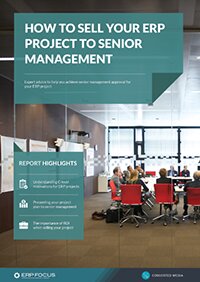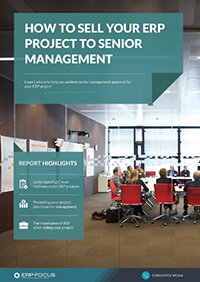Three benefits of Enterprise Resource Planning (ERP) software
Unfortunately, ERP software is not a magic wand that you can wave at your business.
Implementing ERP takes time and money, and can be complicated. However, there’s a reason so many organizations go through the process: because on the other side of go live there are many business benefits to be gained from ERP.
Implemented correctly, and leveraged effectively, ERP is a tool that can transform your organization. Below are a few of the top benefits.
1. Single source of truth
Arguably the biggest benefit to ERP is gaining one source of truth for your organization.
At the end of the day, your business is working towards one collective goal: to better serve your customers. Finding one source of truth for your business eliminates confusion, enhances the strategic direction of your company, improves overall company performance, and therefore increases customer satisfaction.
ERP software, and the implementation process, enables you to establish one source of truth through:
- One integrated system for all business data
- Real-time reporting and dashboarding
- Ability to turn data into action, particularly in the areas of operations, sales, finance, and accounting
2. Reduced costs
There are many ways you can leverage ERP software to reduce costs. A few examples include:
- Procurement management. Procurement is one module of an integrated ERP software package. Using procurement management, you can control and reduce costs by streamlining purchasing processes, enabling better internal compliance, improving efficiency, and optimizing supplier/vendor management.
- Inventory planning. Inaccurately forecasting your inventory creates other business issues, such as too much overhead, lost revenue, and limited company growth. ERP provides the capability to minimize stockouts, prevent overstocking, and improve processing.
- Vendor relationship management. ERP capabilities for vendor management include vendor scorecards to track a vendor's performance, tools to streamline contracts and discounts, and more.
3. Increased revenue (and faster cash)
ERP software functionality enables better company performance through the entire customer lifecycle – from lead or prospect to the sale, to ongoing customer service. This increases sale close rates and ensures better customer retention.
Streamlining areas of operations (like inventory management) as well as back-office functions (accounting and finance) is another avenue for increased revenue.
The right ERP suite can also help you grow your business to bring in additional revenue streams, whether that is by increasing competitiveness in existing markets or going after new ones.
Additionally, ERP helps you bring cash back into your business faster. Using alerts, notifications, and automation features - ERP accounting and finance functionality enables decreased days sales outstanding, not to mention a faster financial close.
Tying it All Together
These are three examples of the benefits of ERP. Other benefits include:
- Real-time reporting
- Better supply chain planning
- Insights into key performance indicators
- Automating manual tasks
- Achieving regulatory compliance
- New technology to replaced outdated systems
- Better tools for employees
- Systematize operations with one ERP across locations
Free white paper

How to sell your ERP project to senior management
Expert advice to help you achieve approval and funding for your ERP project

Related articles
-

What are the benefits of manufacturing ERP?
The advantages of ERP for manufacturing businesses
-

Secret KPI: Why Your ERP Implementation Team Matters More Than Software
Learn how Godlan ensures successful ERP implementation for manufacturers with proven strategies &...
-

Using bills of material to solve business problems
BOM functionality is an often overlooked ERP module - but how can it help your business?

